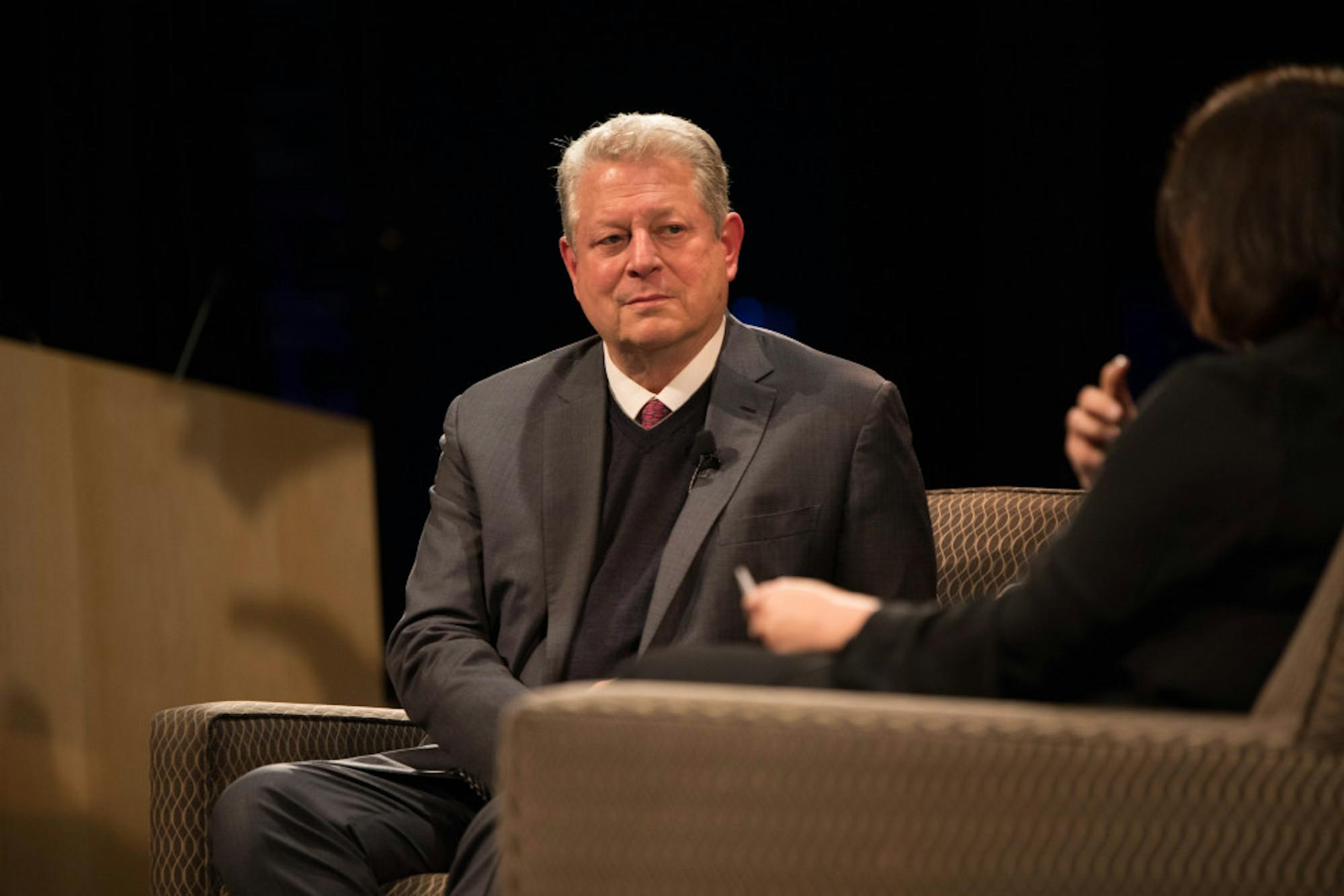Former Vice President Al Gore warned about the consequences of climate change and outlined the steps that individuals can take to better the environment at a talk at Tufts yesterday.
The event was hosted by the Jonathan M. TischCollege of Civic Life, as part of its Distinguished Speaker Series. Kelly Sims Gallagher, a professor of energy and environmental policy at The Fletcher School of Law and Diplomacy, moderated the discussion. Gallagher’s academic focus is on climate issues, and she worked previously in Gore’s office during his time as Vice President in Bill Clinton’s administration.
The event lasted close to an hour and a half. Roughly 400 tickets were distributed at the Mayer Campus Center on Feb. 1, and close to 550 people were expected to attend the event, including students, faculty, staff, alumni and community leaders, according to Jennifer McAndrew, director of communications, strategy and planning at Tisch College. Seventy-five to 80 percent of tickets went to students, McAndrew said.
Gore expressed alarm at the ongoing changes to the Earth’s climate, which he says could presage an ecological disaster. Greenhouse gas emissions, as well as ozone depletion, risk causing droughts, sea level rises and changes to currents in the air and water, Gore explained. He named the crisis as an existential threat to human civilization, especially as parts of the planet become uninhabitable or ravaged by extreme weather.
“Everything we know really has developed within this envelope of ideal conditions,” Gore said. “We are now pushing out of that envelope in very dramatic ways, and the consequences are far more severe than most people realize.”
Gore also voiced his concern that policymakers are not keeping pace with the onset of climate change and its impacts, though he does believe there are viable solutions, especially given the growing affordability of renewable energy.
In an interview with the Daily, Gore stressed the importance of immediate policy changes to combat climate change. He asserted that his first priority is to make greenhouse gas emissions costly by introducing a carbon tax or cap-and-trade system.
“I’m optimistic because technology is working in our favor,” Gore told the Daily. “But we need policy changes, and in order to solve the climate crisis, we need to spend time fixing the democracy crisis.”
Gore acknowledged the need for climate change activists to scrutinize political candidates and their stances on environmental issues. He says candidates that are serious about mitigating climate change should be held accountable to several core questions.
"Do they support a price on carbon, directly or indirectly?" he asked. "Are they willing to make it one of their two or three top priorities in the agenda they’re promoting? Are they staffing up to master the subject and really provide meaningful leadership?"
Gore voiced optimism that policy changes to address climate change are forthcoming. During his speech, he said he has observed a renewal of political will at all levels of government and in both parties, despite the Trump administration’s decision to withdraw the United States from the Paris climate agreement.
“I’m encouraged at the possibility that this election year here in the U.S. may begin a shift in political wins, but we’ll have to wait and see,” Gore told the Daily.
The former Vice President stressed the historical importance of college students' participation in movements for social change and the need for current college students to become engaged in discussion and activism.
“There’s no doubt in my mind,” Gore told the Daily, “that the increasing amount of activism by college students is one of the most important factors in speeding up the responses to the climate crisis.”
Al Gore outlines steps to mitigate climate change at Tisch College event

Former Vice President Al Gore speaks at a Distinguished Speaker Series event hosted by the Jonathan M. Tisch College of Civic Life in Cohen Auditorium on Wednesday, Feb. 7.





